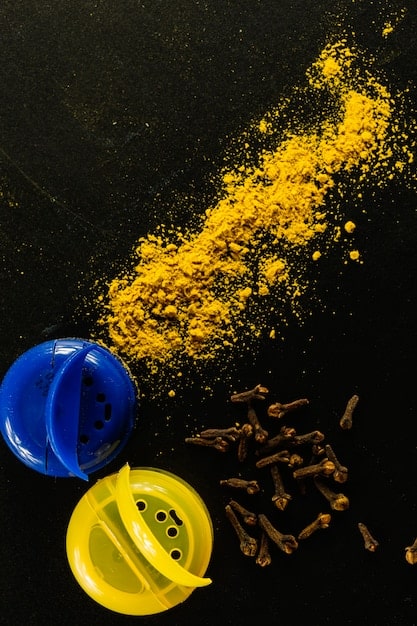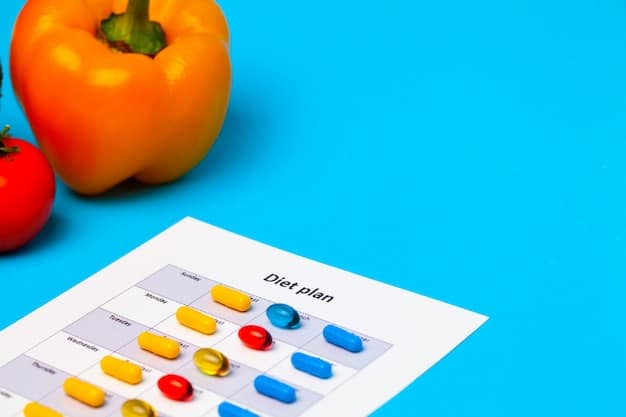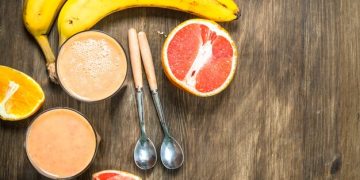Turmeric & Curcumin Supplements: Reduce Inflammation, Accelerate Muscle Recovery

Turmeric and curcumin supplements offer a natural approach to mitigate post-exercise inflammation and accelerate muscle recovery, leveraging curcumin’s potent anti-inflammatory and antioxidant properties to support overall athletic well-being and performance.
In the relentless pursuit of peak physical performance and rapid recuperation, athletes and fitness enthusiasts are increasingly exploring natural avenues to optimize their body’s recovery mechanisms. Among the most discussed and researched natural compounds are turmeric and curcumin supplements: reduce inflammation and accelerate muscle recovery, offering a compelling proposition for those seeking an edge in their journey. This article delves into the science behind these powerful botanicals, providing a comprehensive guide to their benefits, mechanisms, and practical applications in sports and fitness.
Understanding Turmeric and Its Active Compound: Curcumin
Turmeric, a vibrant yellow spice widely used in Asian cuisine and traditional medicine, has gained significant attention in Western health circles due to its remarkable therapeutic properties. While turmeric itself is beneficial, its primary medicinal effects stem from a group of compounds known as curcuminoids, with curcumin being the most abundant and well-studied.
Curcumin is responsible for turmeric’s rich color and much of its biological activity. However, curcumin’s bioavailability (the rate and extent to which it is absorbed into the bloodstream) is naturally low. This challenge has driven extensive research into formulations that enhance its absorption, making supplemental forms more effective for systemic benefits.
The Science Behind Curcumin’s Bioavailability
Traditional turmeric consumption in food delivers limited curcumin to the body. To overcome this, supplement manufacturers employ various strategies to improve absorption. These often involve pairing curcumin with piperine, a compound found in black pepper, which has been shown to significantly enhance curcumin’s bioavailability by inhibiting certain metabolic processes in the liver.
- Piperine Enhancement: Piperine is a key ingredient in many curcumin supplements, boosting absorption by up to 2,000%.
- Liposomal Formulations: Encapsulating curcumin in liposomes allows for better absorption through the gut wall.
- Micellar Formulations: Creating a micellar structure helps curcumin disperse more easily in water, aiding absorption.
- Nanoparticle Technology: Reducing particle size can increase surface area for absorption.
Understanding these advancements is crucial for selecting an effective supplement, as the form of curcumin can significantly impact its therapeutic potential.
The journey from a humble spice to a highly bioavailable supplement underscores the scientific community’s dedication to unlocking turmeric’s full potential for health and recovery. For athletes, effective delivery of curcumin means a greater chance of experiencing its profound benefits in managing inflammation and supporting muscle repair.
Inflammation: The Athlete’s Double-Edged Sword
Inflammation is a natural and necessary response to injury and infection, playing a vital role in the healing process. However, chronic or excessive inflammation, particularly within the context of intense physical training, can hinder recovery, impair performance, and even contribute to long-term health issues. Athletes frequently walk a fine line between beneficial acute inflammation and detrimental chronic inflammation.
During strenuous exercise, muscle fibers undergo microscopic damage, triggering an inflammatory cascade. While this initial inflammation is crucial for initiating repair mechanisms, prolonged or uncontrolled inflammation can delay muscle regeneration, increase soreness, and reduce subsequent training capacity. This is where natural anti-inflammatory agents like curcumin can offer significant advantages.
Acute vs. Chronic Inflammation in Sports
Acute inflammation is an immediate, short-term response to exercise-induced muscle damage, essential for signaling the immune system to initiate repair. It typically resolves within a few days, leading to muscle adaptation and growth. Chronic inflammation, on the other hand, is a persistent, low-grade inflammatory state that can result from overtraining, insufficient recovery, or poor dietary habits.
Chronic inflammation can manifest as persistent muscle soreness, reduced range of motion, fatigue, and an increased risk of injury. It can also impede protein synthesis and reduce the body’s ability to recover effectively, trapping athletes in a cycle of underperformance and vulnerability.
- Beneficial Acute Inflammation: Essential for muscle adaptation and growth; short-lived.
- Detrimental Chronic Inflammation: Impedes recovery, increases soreness, and elevates injury risk; persistent.
Managing the inflammatory response is paramount for athletes aiming for consistent performance and longevity in their sport. Curcumin’s ability to modulate various inflammatory pathways without the common side effects associated with conventional anti-inflammatory drugs makes it an appealing natural alternative.
Curcumin’s Anti-Inflammatory Mechanism
Curcumin’s reputation as a powerful anti-inflammatory agent is not merely anecdotal; it is supported by a wealth of scientific research elucidating its intricate mechanisms of action. Unlike pharmaceutical anti-inflammatory drugs that often target a single pathway, curcumin operates via multiple molecular targets, offering a broad-spectrum approach to inflammation modulation.
At the core of its anti-inflammatory prowess is curcumin’s ability to inhibit key molecules that play central roles in the inflammatory cascade. This includes suppressing the activity of NF-κB, a protein complex that controls the expression of numerous genes involved in inflammation. By inhibiting NF-κB, curcumin effectively reduces the production of pro-inflammatory cytokines, enzymes, and adhesion molecules.

Key Anti-Inflammatory Pathways Targeted by Curcumin
Curcumin’s anti-inflammatory effects extend beyond NF-κB inhibition. It also influences other critical pathways and enzymes, contributing to its comprehensive action against inflammation:
- Cyclooxygenase-2 (COX-2) Suppression: NSAIDs (non-steroidal anti-inflammatory drugs) target COX-2, an enzyme that produces inflammatory prostaglandins. Curcumin similarly inhibits COX-2, but without the gastrointestinal side effects often associated with NSAIDs.
- Lipoxygenase (LOX) Inhibition: LOX enzymes are involved in the production of leukotrienes, another class of inflammatory mediators. Curcumin’s ability to inhibit LOX further enhances its anti-inflammatory profile.
- Modulation of Cytokines: Curcumin downregulates pro-inflammatory cytokines such as TNF-α, IL-1β, and IL-6, while potentially upregulating anti-inflammatory cytokines.
- Scavenging Free Radicals: Beyond its direct anti-inflammatory effects, curcumin is a potent antioxidant, neutralizing harmful free radicals that contribute to oxidative stress and inflammation.
This multifaceted action allows curcumin to effectively mitigate inflammation at various stages, making it particularly beneficial for managing exercise-induced muscle damage and promoting faster recovery. Its natural origin and impressive safety profile further enhance its appeal as a viable supplement for athletes.
Accelerating Muscle Recovery with Turmeric and Curcumin
For athletes, the effectiveness of any supplement is ultimately judged by its tangible impact on performance and recovery. Turmeric and curcumin supplements are increasingly recognized for their potential to accelerate muscle recovery, primarily through their potent anti-inflammatory and antioxidant properties. This translates to reduced muscle soreness, faster return to peak performance, and an overall enhanced recovery experience.
Heavy training sessions invariably lead to muscle damage and subsequent inflammation. While this process is part of muscle adaptation, minimizing the duration and intensity of post-exercise inflammation can significantly speed up recovery. By modulating inflammatory pathways, curcumin helps to alleviate delayed onset muscle soreness (DOMS), a common complaint among athletes, and facilitates quicker muscle repair.
Impact on DOMS and Muscle Repair
DOMS, characterized by muscle soreness, stiffness, and tenderness that peaks 24-72 hours after unaccustomed or intense exercise, is a direct result of muscle microtrauma and the accompanying inflammatory response. Studies suggest that curcumin supplementation can significantly reduce the severity and duration of DOMS, allowing athletes to resume training or competition sooner.
Beyond alleviating soreness, curcumin’s antioxidant properties help battle oxidative stress induced by strenuous exercise. Oxidative stress can damage muscle cells and impede recovery. By neutralizing free radicals, curcumin supports cellular integrity and promotes optimal muscle regeneration.
- Reduced DOMS: Curcumin helps alleviate muscle soreness and tenderness after exercise.
- Faster Muscle Regeneration: By controlling inflammation and oxidative stress, curcumin supports quicker repair of muscle fibers.
- Improved Performance: Quicker recovery means athletes can maintain a higher training volume and intensity.
Incorporating turmeric and curcumin into a recovery regimen can be a game-changer for athletes aiming to maximize their training output and minimize downtime due to muscle fatigue and soreness. This natural approach offers a sustainable path to enhanced recuperation, allowing for consistent progress and reduced injury risk.
Recommended Dosages and Supplement Forms
Navigating the world of turmeric and curcumin supplements can be complex, given the variety of forms and dosages available. For optimal results in reducing inflammation and accelerating muscle recovery, understanding what to look for and how to dose effectively is crucial. The primary goal is to maximize curcumin’s absorption while ensuring safety and efficacy.
As previously mentioned, standard curcumin has low bioavailability. Therefore, choosing a supplement that enhances absorption is paramount. Commonly, this means looking for formulations that include piperine (often listed as black pepper extract or BioPerine), or advanced delivery systems like liposomal, micellar, or nanoparticle curcumin.
Guidelines for Supplement Selection and Use
When selecting a supplement, consider the following:
- Bioavailability Enhanced Formulas: Prioritize supplements explicitly stating enhanced absorption, typically through piperine or specialized delivery methods.
- Curcuminoid Content: Look for supplements standardized to a high percentage of total curcuminoids (e.g., 95% curcuminoids), as this indicates the purity and potency of the active compounds.
- Reputable Brands: Choose products from reputable manufacturers that provide third-party testing for purity and potency.
- Dosing: Typical effective dosages for enhanced curcumin range from 500 mg to 1,500 mg of curcuminoids per day, often split into two doses. However, always follow the specific instructions on the supplement label, as formulations vary greatly.
It is generally advisable to take curcumin supplements with food, especially those that contain healthy fats, as curcumin is fat-soluble, which can further aid absorption. For athletes, timing can also be a factor; some prefer to take it post-workout to mitigate immediate inflammatory responses, while others integrate it as part of their daily wellness routine.
Consulting with a healthcare professional or a sports nutritionist before starting any new supplement regimen is always recommended, especially for individuals with pre-existing health conditions or those taking other medications. This ensures that the chosen supplement aligns with individual health needs and goals.
Safety, Side Effects, and Considerations
While turmeric and curcumin supplements are generally considered safe for most individuals, understanding potential side effects, interactions, and contraindications is essential for responsible supplementation. As with any potent natural compound, mindfulness about its use ensures both efficacy and safety, especially for athletes who may be pushing their bodies to the limits.
The vast majority of studies report minimal side effects associated with curcumin supplementation, even at relatively high doses. The most commonly reported side effects, typically mild, include gastrointestinal discomfort such as nausea, diarrhea, or indigestion. These issues are often dose-dependent and can be mitigated by reducing the dosage or taking the supplement with food.
Potential Interactions and Contraindications
- Blood Thinners: Curcumin may have mild anticoagulant (blood-thinning) effects. Individuals taking anticoagulant medications (e.g., warfarin, aspirin) should exercise caution and consult their doctor due to an increased risk of bleeding.
- Gallbladder Issues: Curcumin can stimulate bile production, which may be problematic for individuals with gallstones or bile duct obstruction. Consultation with a doctor is advised.
- Diabetes Medications: Curcumin may lower blood sugar levels. Diabetics taking medication should monitor their blood glucose closely and consult their physician to adjust dosages if necessary.
- Pregnancy and Breastfeeding: There is limited research on the safety of high-dose curcumin supplementation during pregnancy and breastfeeding. It is generally advisable to avoid supplemental forms during these periods, though culinary turmeric is safe.
- Iron Absorption: High doses of curcumin might inhibit iron absorption in some sensitive individuals, though this is rare.

Given curcumin’s widespread biological activity, it’s prudent to discuss its use with a healthcare provider, particularly if one has underlying health conditions, is scheduled for surgery, or is on multiple medications. This proactive approach helps to pre-empt any adverse effects and ensures that the supplement contributes positively to well-being and athletic performance without unintended complications.
For athletes, recognizing that supplements are adjuncts, not replacements, for a balanced diet, adequate hydration, proper training, and sufficient rest is crucial. Curcumin can indeed be a powerful ally in managing inflammation and accelerating recovery, but its role should be integrated into a holistic health and performance strategy.
Integrating Turmeric and Curcumin into an Athlete’s Regimen
For athletes aiming to maximize their training gains and minimize recovery periods, strategically integrating turmeric and curcumin into their daily regimen can be highly beneficial. This involves not only understanding supplement forms and dosages but also considering the timing of intake relative to training and competition, and how it fits into a broader nutritional strategy.
Given curcumin’s role in modulating inflammation and oxidative stress, it can be particularly valuable during phases of intense training, rehabilitation from injury, or as a general daily prophylactic for joint health and systemic well-being. Its versatility makes it suitable for various types of athletes, from endurance runners to strength trainers.
Practical Integration Tips for Athletic Performance
- Daily Maintenance: Many athletes opt for a consistent daily dose to support general anti-inflammatory processes and joint health. This can be taken with a meal, often the largest, for better absorption.
- Post-Workout Support: Taking a curcumin supplement immediately after intense training or competition can help kickstart the anti-inflammatory response, potentially reducing DOMS and accelerating the early stages of muscle repair.
- Injury Rehabilitation: During recovery from an injury, higher doses, under professional guidance, might be used to aid in reducing inflammation and promoting tissue repair.
- Complementary Nutrients: Curcumin works synergistically with other anti-inflammatory nutrients, such as omega-3 fatty acids (found in fish oil), vitamin C, and magnesium. Combining these can amplify overall benefits.
While supplements provide concentrated doses, incorporating turmeric into the diet through culinary uses can also contribute to overall health. Adding turmeric to smoothies, curries, or stews offers a flavorful way to consume the spice, though the medicinal doses and enhanced absorption found in supplements are typically higher.
Ultimately, the decision to use turmeric and curcumin supplements should be part of a well-considered, individualized approach to athletic health. By leveraging the power of these natural compounds, athletes can support their bodies’ innate ability to recover, adapt, and perform at their best, pushing boundaries while prioritizing long-term well-being.
| Key Point | Brief Description |
|---|---|
| 🌿 Curcumin’s Power | The active compound in turmeric, curcumin, is known for its potent anti-inflammatory and antioxidant properties. |
| 🔬 Enhanced Absorption | Supplements often include piperine or use advanced delivery systems to significantly boost curcumin bioavailability. |
| 💪 Muscle Recovery | Helps reduce exercise-induced inflammation, alleviate DOMS, and accelerate muscle regeneration for athletes. |
| ⚠️ Safety Aspects | Generally safe, but consult a doctor for potential interactions, especially with blood thinners or gallbladder issues. |
Frequently Asked Questions
▼
Turmeric is the spice, a root from the Curcuma longa plant, while curcumin is the primary active compound found within turmeric. Curcumin is responsible for most of turmeric’s powerful health benefits, especially its anti-inflammatory and antioxidant effects.
▼
Curcumin supplements aid muscle recovery by modulating the body’s inflammatory response to exercise-induced damage. They help reduce pro-inflammatory markers and oxidative stress, which leads to decreased muscle soreness (DOMS) and accelerated tissue repair after intense physical activity.
▼
Bioavailability refers to the rate and extent to which a substance is absorbed into the bloodstream. Native curcumin has low bioavailability, meaning little of it reaches the body’s systems. This is why supplements often include piperine or use advanced delivery methods like liposomes to enhance its absorption and effectiveness.
▼
While culinary turmeric offers some health benefits as part of a balanced diet, the amount of curcumin present is typically low. To achieve the therapeutic doses necessary for significant anti-inflammatory and recovery effects seen in studies, a concentrated curcumin supplement with enhanced bioavailability is usually required.
▼
Curcumin is generally well-tolerated. Mild side effects can include gastrointestinal discomfort. It may interact with blood thinners, certain diabetes medications, or affect individuals with gallbladder issues. Always consult a healthcare professional before starting any new supplement, especially if you have pre-existing conditions or are on medication.
Conclusion
In the dynamic world of athletic performance and recovery, natural allies often hold significant untapped potential. Turmeric and its potent active compound, curcumin, stand out as compelling contenders in the quest for optimized physical well-being. By harnessing curcumin’s remarkable anti-inflammatory and antioxidant capabilities, athletes can effectively mitigate the adverse effects of exercise-induced inflammation, accelerate muscle repair, and ultimately enhance their overall recuperation. While the complexities of bioavailability require careful supplement selection, the evidence overwhelmingly points towards a valuable role for these ancient botanicals in modern sports science. As with any addition to a rigorous regimen, thoughtful integration and professional consultation are key to unlocking the full spectrum of benefits, paving the way for more resilient bodies and peak performance.





